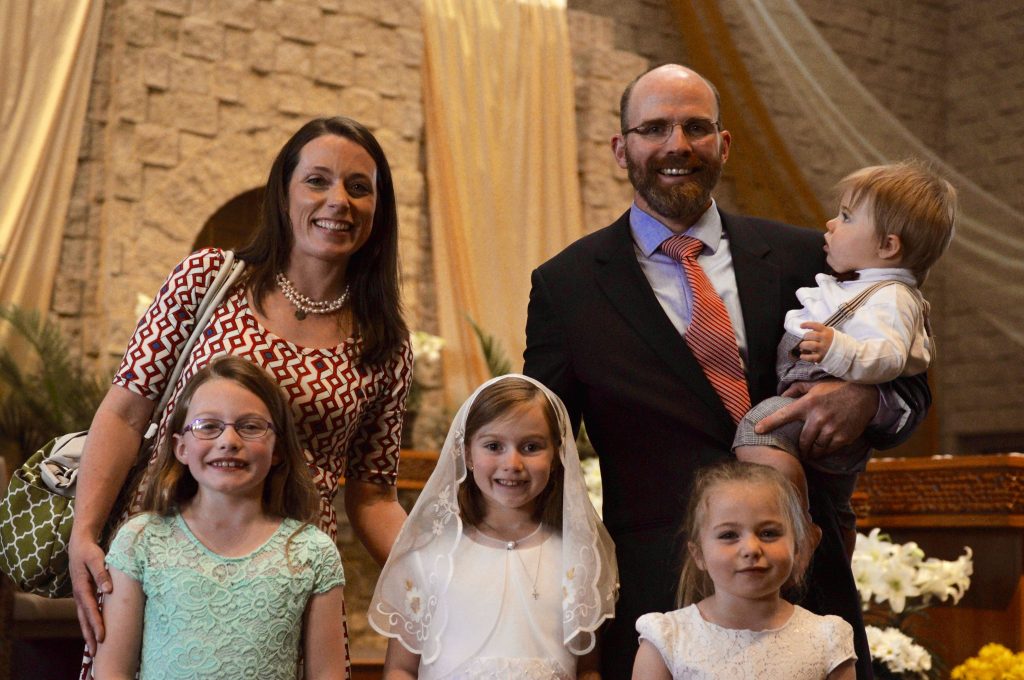A few weeks ago, someone I know posted a link to an article titled “I Used to Say ‘I’m Blessed,’ Until I Asked These Two Questions.”
Although this wasn’t the first time I’d read something with this idea that saying, “I’m Blessed” is somehow a bad thing, it was the first time I had read something that seemed to have the intent of shaming and ridiculing people who utter this, or similar phrases.
You can read the article here.
When I first read it, I was angry. I was shocked and appalled that anyone would feel the need to write something so hateful, to put down those who choose to express their joy by sharing their blessings. I was also frustrated, because I could see that the author of the article, and most of the people commenting on and sharing it, truly do not understand what it means when someone says they are “blessed.” I immediately began formulating a scathing response in my mind, debunking, one by one, the incorrect statements and assumptions made by the author of this article.
But then I stopped and remembered that writing responses in anger is not generally a good idea. So I waited for a while, and thought about the article, and decided that, while my response needn’t be angry, it still needed to be.
It needed to be, because there are so many misconceptions about Christian people. About what we believe or don’t believe. About how we act or should act and why. The article linked to above is a good example of how Christian belief and action can be twisted through misunderstanding. How something with intentions and origins that are true and beautiful and good can be misrepresented and turned into something worthy of scorn or ridicule or disgust.
The author of the article I linked to says that people who say they are blessed are basically saying they are lucky, but adding an emphasis on the idea that God had something to do with their situation. And so, when someone says he is blessed, he is saying God has helped him more than others, which is arrogant and disgusting. This argument is based on the idea that when someone says he is blessed, he is making a comparison to others and saying he is better, and that if there were no others to compare with, saying one is blessed would be pointless. He suggests just dropping the God reference and just using the word “lucky” in order to be more accurate, humble, and inclusive.
However, there are several significant errors in this line of thinking. Namely, when a Christian person says she is blessed, it has absolutely nothing to do with saying she is lucky, and she is making no assumptions about or comparisons with another person at all. Even if she were the only person on earth, it would still be completely appropriate for her to proclaim, “I’m blessed.”
^^A couple of my many blessings^^
Saying that one is blessed is not a way of rubbing one’s specialness in others’ faces. It is not arrogant or egotistical (both of these are words used by the author to describe the act of saying, “I’m blessed.”). It is a way of sharing one’s joy and awe and wonder at the awesomeness of God and the many ways God can work in one’s life. It is giving credit where credit is due. It is the ultimate humility in saying, “I am not worthy of this. I do not deserve this. I am not so special. And yet… look at the many ways God has showered me with blessings.” Note that this does not imply that in saying that God has showered me with blessings, He must like me better than you. It is not a comparison. It is an acknowledgement of the goodness of God. Period. It is, in part, an expression of intense gratitude.
However, this takes me to the author’s second main point, which seems to be that when people say they’re blessed, what they really mean is that they’re grateful. Further, the author suggests that “grateful” is the better word because, “Saying you’re blessed doesn’t clearly describe the context of what you’re feeling.”
Think of this. If I say, “I’m blessed,” and someone says to me, “No, you’re not. What you really mean to say is you’re grateful. That’s a better description of what you’re feeling,” who is being arrogant? Am I not a better judge of what I am feeling than the author of this article or any other person? The author writes, “You’re not stupid, you chose the word ‘blessed’ rather than ‘grateful’ for a reason. Why?” In this statement he is absolutely correct, though he doesn’t seem to actually be interested in the “why” of the matter.
True, I am not stupid. Nor are the other people who choose to use the word “blessed” rather than “grateful.” The reason for this is that the word “blessed” actually does more clearly describe the context of what I’m feeling. To say I’m grateful for something is fine. I tell my husband I’m grateful that he did the dishes. I tell my children I’m grateful for the dandelions they bring me. And yes, I tell God on a regular basis that I am grateful for all that He has given me. But that does not encompass the fullness of the term “blessed.” To say one is blessed includes gratitude, but also joy, awe, wonder, humility, and more, all in reference to the greatness of God.
^^More of my beautiful blessings^^
At another point in the article, the author expresses doubt about the sincerity, or intelligence, of some who say they are blessed because he happens to know that these people have experienced recent inconveniences and/or hardships. He seems to be saying that it is not possible for people to experience difficulty and feel blessed at the same time. He fails to understand that, because of knowledge of the goodness and mercy of God, Christians can often find blessings even in suffering. Many are even able to see suffering itself as a blessing. This is part of the beauty of the teachings of the Catholic Faith, though for the sake of not making this post into a novel, I won’t get into this particular issue more here.
I do want to give an example though. I know an amazing woman who lost her oldest daughter this past year after a painful struggle with cancer. In spite of, or maybe even because of, this tragic loss, my friend’s faith is still rock solid and is a beautiful example of God’s grace in action. Every time I speak to her, either in person or in an email, or even just to see a Facebook status update from her, she is radiant and humble with her love of and trust in God. She expresses gratitude and describes the many blessings she is able to see in the aftermath of her daughter’s death. She almost always expresses herself in part by using the word “blessed.”
Can you imagine someone telling her that she can’t really mean that because she has experienced tragedy? That her statements of being blessed are insincere because she has suffered?
I cannot.
The thing is, when one has faith in God, one can find true, deep, abiding joy, in good times and in bad times. This is different from feeling good in the world. It is not dependent on moment-to-moment surface happiness. This joy is what it means to be “blessed.”
I want to clarify that, in writing this post, my goal is not to ridicule the author of the other I linked to. It is simply to point out the errors that occur when one assumes that they know another’s heart on matters that they just do not understand.
It is very common in our world these days for people to attribute all sorts of ugly intentions to Christians, to mock and deride beliefs, behaviors, and traditions that they do not take the time or the care to learn about. Calling it “arrogant” and “egotistical” and “disgusting” for someone to simply say, “I’m blessed,” is a pretty good example of this.
My hope is that people will just ask if they do not understand. If you don’t get why someone says, “I’m blessed,” ask her. Or don’t, that’s fine too. But if you choose not to seek to understand, at least please do not shame and disregard her as ignorant just because you cannot grasp her meaning or intent.
I hope that this will go beyond this one example and extend to other areas of misunderstanding as well. More specifically, I offer a gentle challenge those who mock and dismiss Christianity in general, and Catholicism in particular (including many who attend Catholic parishes), to actually learn about what you are rejecting **
I have been so truly blessed (yes, blessed) to have been led to the Catholic Faith. I know that God led me and my family here. At times we experienced suffering on our way to conversion/reversion, but we now see these difficulties as the beautiful blessings they were, as they brought us to the true Faith. I want to share this blessing with anyone I can. I pray that you are open to experiencing God’s blessings in your life too.
**I have stated this in previous posts, but I will reiterate it here: if you have a question about the Catholic Faith, if there is something you disagree with or even hate about the Catholic Church, feel free to ask me about it. If I don’t know the answer, I will find it for you.






Indeed, Amy, you are “blessed.” You are also a “blessing” to those of us who read your posts. Thank you for sharing your thoughtful insights!
Thank you for putting the record straight. I was feeling guilty about using “I’m Blessed. It is the way I feel when I have the pleasure of watching my granddaughter grow before my eyes, as well as my son’s health. He has been in remission for 5 years from a serious auto-immune condition. I thank God everyday. I’m grateful. I’m Blessed. .
Thank you with all my heart for putting “I’m Blessed” into perspective.
Awesome post. Blessed to come across this. GBU. ♥️
Catholics have devotion to Mary. No where in the bible does it say Mary is the intercessor between Jesus Christ and man. Nor does the bible even hint that we should pray to Mary. Luke 1:47 Mary’s own words. She has a savior too.
1 Timothy 2:5
For there is one God;
there is also one mediator
between God and humankind
Christ Jesus, himself human,
who gave himself a ransom for all
Rely only on holy scripture. . We have the bible so that we should not be deceived.
You are correct. Catholics do have a devotion to Mary. However, a common misconception is that we worship her, which we do not. We honor her as the mother of our Lord, as He honored her in His life and at the time of His death (and after). Right before He died, our Lord said to John “Behold, your mother.” (from Jn 19:27). He gave Mary not only to John as his mother, but to all of us as our Blessed Mother. If you look at the very next verse in Luke (after the one you quoted), you will see that Mary also said, “For He has looked with favor on His lowly servant; from this day, all generations will call me blessed.”
Through Mary’s mediation, Christ entered the world. The Catholic Church teaches that Mary’s intercession, or mediation, on our behalf is in no way to take away from that of Christ. Christ’s mediation is primary, independent, and wholly necessary for our salvation, as the verse you cited from 1 Timothy tells us. Mary’s mediation is secondary and dependent upon Christ. Just before the verse you mentioned is this: “First of all, then, I ask that supplications, prayers, petitions, and thanksgivings be offered for everyone. . . This is good and pleasing to God our savior” (1Tim 2:1,3). Because Christ is the one, sufficient mediator between God and men, we are able, through Him, to do these very things. We pray for each other, and we ask the saints in Heaven to pray for us as well, especially Mary who was uniquely favored by God.
So there is Biblical support for devotion to Mary and invocation of her intercession and that of the other saints. But to address your suggestion that I should “Rely only on Holy Scripture [so as to] not be deceived,” I can first point out that Holy Scripture itself does not at any point say that we are to rely on nothing but the Bible. In fact, 2 Thes. 2:15 tells us “So then, brethren, stand firm and hold to the traditions which you were taught by us, either by word of mouth or by letter.” Jesus established His Church, the Catholic Church, with Peter as the first pope, and instructed His apostles to “Go, therefore, and make disciples of all nations” (Mt. 28:19) so that people would be guided by the men He chose to lead them in their faith. He never said that the Bible (which of course did not even exist at that time), was to be the only guide for us.
Just a few thoughts on your comment. Thank you for leaving it, and I’m sorry I took so long to reply. I have not been as active on the blog for a while. I’m happy to discuss further with you if you’d like.
All scripture is inspired by God and is useful for teaching, for reproof, for correction…
(2 Timothy 3:16) …but had no marital relations with her until she had borne a son and he named him Jesus. (Matthew 1:24-25) Jesus had brothers and sisters. (Matthew13:55-56, Mark 6:3) The saints. (Ephesians 2) Impartiality. (Acts 10:34)
Intercession. (Hebrews 4:15-16, 7:25, 1John 2:1) Peter and the apostles were all married. (1Corinthians 9:5) Bishops.(1Tim.3) Deacons.(1Tim.3:8)
…For the time is coming when people will not put up with sound doctrine, but having itching ears, they will accumulate for themselves teachers to suit their own desires, and will turn away from listening to the truth and wander away to myths. (1Timothy 4)
I’m glad you responded! I wasn’t sure if you would see my reply to your comment, since I typed it quite a while after the fact.
So, first of all let me say that I think your comment is a prime example of why God gave us the Church and Sacred Tradition, to assist us with understanding the Bible and interpreting its Truths. I wholeheartedly agree with the fact that all Scripture is inspired by God. But it was passed along by men through oral tradition and writings. There has never been any instruction given by God that said that the only teachings or writings that were inspired by Him are the ones that were included in the Bible. It doesn’t make sense for us to assume that God gave us only those specific stories and letters that were included in the Bible and then nothing more. Ever. In fact, the New Testament of the Bible is made up of the teachings of the early leaders of the Catholic Church, the apostles, and other disciples of Jesus and their disciples after them. Apostolic succession. Those men were inspired by God then, and they continue to be to this day. After the Reformation everyone began interpreting the Bible for themselves. And we can see very clearly what has happened as a result. Men have begun to misinterpret the inspired Word of God. They have used Biblical teachings for their own purposes, and people are at odds about what the various teachings mean. 1 Timothy 4 speaks directly to this. It seems to me to be a direct and very clear prediction of Martin Luther and the Reformation. Because of the Reformation, much of Christianity has “wandered away to myths.”
Jesus left us with the Church. He left us with Peter and the rest of the apostles and disciples who were put in charge of taking the teachings of Jesus to the whole world. He said, “He who hears you hears me, and he who rejects you rejects me, and he who rejects me rejects him who sent me.” (Luke 10:16) Right there He set up the authority of the Church. To be certain, because the leaders of the Church are and always have been human, there have been (and still are) many who have been deeply flawed. Many have done terrible things. And yet He said, “And so I say to you, you are Peter, and upon this rock I will build my church, and the gates of the netherworld shall not prevail against it.” (Matthew 16:18) He knew that the leaders of the Church would not be perfect, that heresies would cause groups to split off, but He assured us all that His Church, the Catholic Church, would prevail.
All this to say that we have the Church and Sacred Tradition to assist us, so we aren’t misled in interpreting Scripture. To speak to some of the passages you mentioned above, there is nothing in the Bible that gives evidence of Mary having children other than Jesus. Matthew 1:24-25 is intended to be sure that we know that Jesus was not possibly conceived through ordinary human conception. It does not say that Joseph had any relations with Mary after Jesus was born either. Tradition tells us that Joseph was older and had been married prior to his marriage to Mary, and that he already had other children, which is likely where the reference to siblings of Jesus comes from. The Protoevangelium of James, written around A.D. 120, gives a great deal of information regarding the perpetual virginity of Mary, how she was vowed to a life of perpetual virginity by her mother Anne before her birth, and how Joseph was chosen to be the guardian and protector of her virginity. This document mentions Joseph’s previous marriage and children as part of the reason he was chosen for this grave responsibility.
Similarly, 1 Corinthians does not say that all of the apostles were married. It is Paul’s assertion that he is equal to the other apostles and has the same rights that they, and others have. In fact, further down, he explains that they do not use these rights (1Cor 9:12-18). I do not claim to be any sort of expert on interpreting Scripture. But I do know that in order to understand the Bible, we must understand the historical context in which it was written. What was the purpose for Paul to write these things to the Corinthians? I don’t know exactly, but when that one verse is taken in context with the rest of the passage, it becomes clear that he is simply trying to explain that he has the same rights as the other apostles.
I do want to say that I can understand where you’re coming from. After the Reformation, protestant Christians have split into tens of thousands of groups, all interpreting the sacred Word of God in slightly different ways, and thereby distorting and losing its context over time. This context is maintained by Sacred Tradition, but most people are not familiar with it. I was raised protestant and I had many misconceptions about the Catholic Church, which I held until I researched the Church and her actual teachings with an open mind, rather than relying on the commonly promoted misinformation to which I had been exposed as a younger person. Reading the writings of early Church fathers can be very illuminating. If you’re interested, I’d recommend Four Witnesses: The Early Church in Her Own Words by Rod Bennett.
Thanks again for your response. If you’d prefer to correspond further about this via email, you can contact me at motherhoodandmiscellany at gmail dot com, or if you wish to reply here, that’s fine too.
May God bless you.
Please carefully reread the verses I previously sent you. The bible does clearly say these very things. I didn’t change any of the words nor meaning of the words, but you did. This is the written word of God. Here is a scripture concerning Mary and these are the words of Jesus. (Matthew 12:46-50) While he was still speaking to the crowds, his mother and his brothers were standing outside, wanting to speak to him. Someone told him, “look, your mother and your brothers are standing outside, wanting to speak to you.” But to the one who had told him this, Jesus replied, “Who is my mother, and who are my brothers?” And pointing to his disciples, he said, “Here are my mother and my brothers! For whoever does the will of my Father in heaven is my brother and sister and mother.” Take care, God bless
With all respect and charity, I did read the verses carefully. I do not dispute what the Bible says, and I did not change the words nor the meaning of the words. I simply looked at them in context. All words, written and spoken, must be considered in their proper context in order to accurately understand them. This can mean considering the words both before and after those in question, historical information, cultural factors, translation issues, and intent of the speaker/writer to name a few. All of these things are especially important to consider to avoid making errors in interpreting and understanding the Word of God. Sacred Tradition came before the Bible and is what informed the compilation of the Bible. It is what continues to guide us in understanding Holy Scripture. That said, I acknowledge that I am not likely to change your mind on this issue, and that’s okay. Only God can bring about a conversion of heart and mind. He certainly did for me. You’re in my prayers 🙂
the new testament is a commentary of the old testament.
Are you saying that Mary (the woman who gave birth to Jesus) shouldn’t be revered? That’s how I’m interpreting your post.
No. I am not saying that, nor would I ever say that. I’m not sure where you got that from this post? Maybe this comment is in reply to the earlier one that originally referenced Mary? It’s hard to tell when the comment thread stretches down so far.
THANK YOU THANK YOU THANK YOU …for being a voice of rationality. I too was appalled by the article you reference. What’s even more appalling is the fact that this seems to be the latest “fad” among Christians and non-Christians alike, i.e., attacking the idea of a God who blesses His people. Thanks for being a fellow Catholic believer (I’m a convert by the way) who had no qualms about calling out such nonsense.
blesssed :
made holy; consecrated.
“the Blessed Sacrament”
Has nothing to do with having kids or material things.
Saying you’re blessed with all your children doesn’t sound right. Anyone can have many many “blessing” with unprotected sex. Even the people that end up abusing and killing their own children. Others like my mother in law, who has lost 2 sons can’t say the same thing as you do. Why is she not blessed with still having all her childre. She lost one to cancer and another to a murder. Definitely does imply that you’re better then someone else! I see people on social media saying they’re blessed because they just opened a new business. One of these people doesn’t even believe in God but there he is using the word blessed because he has a business and money. That’s more like they worked hard. That’s not blessed. I must be the only one here that doesn’t agree with your article. Oh well 🙂
I appreciate your response, Lili, but I think you may have misunderstood me. While I do mention my children as blessings, I was not suggesting that blessings are just children or material things. To say that one is blessed can refer to any number of things, even including suffering. In fact, I stated, “It is a way of sharing one’s joy and awe and wonder at the awesomeness of God and the many ways God can work in one’s life” and specifically indicated that this is in no way about comparing myself to someone else, because I do not view any of the blessings God has bestowed upon me (including but not limited to my children) as the result of anything I did. I’m sure there are some people, particularly if they don’t even believe in God, who may be using this word in a different way, but even those people are experiencing blessings from God (God does not only bless those who believe in Him). As a side note, I would also argue that all children, whether they are desired by their parents or not, are still blessings from God.
That said, it’s okay if you don’t agree with my post. I’m terribly sorry to hear about your mother-in-law’s losses and suffering. Thanks for your comment.
I agree 100%. I have many serious problems, but many joys, and right now I am enjoying the sunshine – I, too, am blessed! 🙂
Amy,
I appreciate your perspective, but when you say “I’m blessed” appears to be much (MUCH) different than those who I see/hear saying the same thing. My opinion: they ARE saying God has given them gifts that are greater than the gifts God has given to others.
I’m sure everyone “means well” when they say those words, but even well-intentioned everyday language needs to be challenged from time to time. This is one of those situations where I think we need to come up with better words to express our intent, without mixing the message up with words and phrases that have multiple (and greatly disparate) meanings.
As a Catholic (with a lifetime of “Catholic Guilt”), I can’t emphasize enough that to assume God favors any one person/family/group over others is quite arrogant and probably the definition of Pride (Deadly Sin) and taking the Lord’s name in vain (Commandment).
Hi John. I can see your point, and agree that there are some people who do not use this phrase in the way I described. Many people do use it very casually without taking a notice of the actual meaning of what they’re saying. I do not think I have ever observed someone saying it in a way that would suggest that they are in fact comparing themselves to others in the way you suggest (though I don’t discount the possibility).
However, I think that the misuse of the word “blessed” is similar in some ways to the misuse of the word “love,” i.e. someone saying “I LOVE pop tarts.” This is a common way that people use the word that loses the real meaning of it. But that doesn’t change the actual meaning of the word “love” or mean that we should not use that word in its correct context because some people misuse it.
I think the same can be said for the word “blessed.” What I described here is a correct use of the word, even if some others use it in an overly casual or even incorrect way. I agree that it may be appropriate to challenge a misuse of the word (which is part of the reason I wrote this post in the first place), but not necessarily that we need to come up with better words because this one may be used in disparate ways (though if you have suggestions for a better word, I’d be happy and interested to hear it).
Either way, I do appreciate your thoughtful comment.
Great article, keep posting!
Thank you for your beautiful post. I’m a Muslim, and I feel blessed that I had the opportunity to read and connect with the ideas that you courageously shared. Not only did your words enable me to relate to you, but they also gave me the confidence to use the words “I’m blessed” without worrying about the insincere assumptions other people might make. To fall in love with being alive …. that has nothing to do with comparing ourselves to others. People shouldn’t see those who celebrate their blessings as threats either – because they have a lot of wisdom to share, if people are willing to listen.
Thank you for your kind and thoughtful comment!